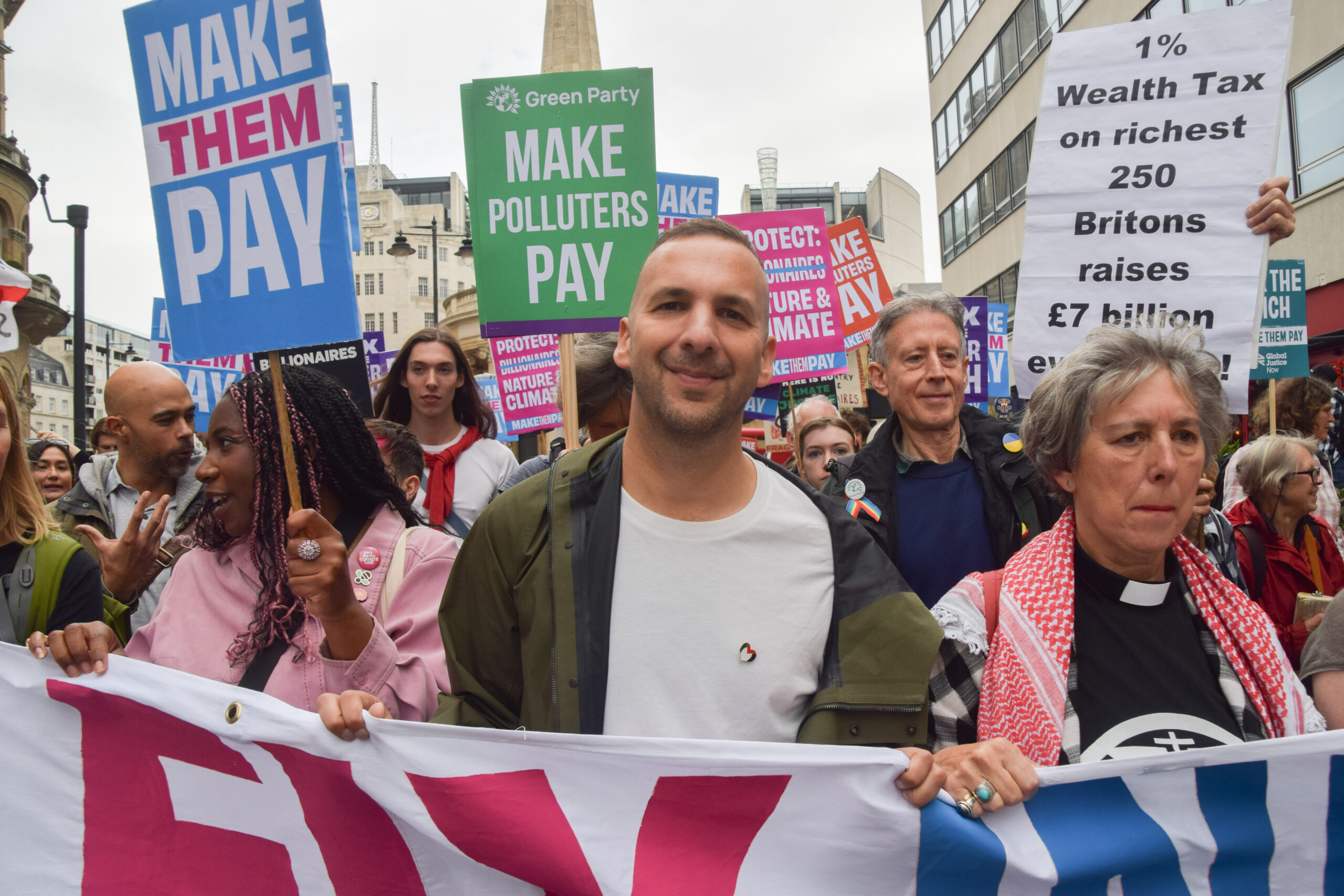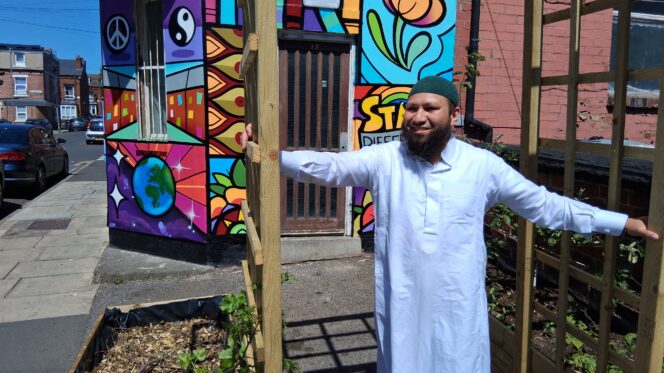Zack Polanski Must Now Transform His Fans Into Activists

Most of the thousands of people who have recently joined the Greens will have experienced the party’s rise largely through their phone screens, as a series of soundbites and clapbacks. But more than almost any other party, theirs was built on hard work.
Other parties, and even some of the newer ones, have been helped enormously by the establishment. The Tories and Labour have big donors and only slightly differing handfuls of mainstream media outlets. Farage is the oligarchy’s spin doctor, and the darling of the rightwing press. Even the nascent Your party benefits from the fame and social media following Corbyn built as Labour leader.
The Greens, on the other hand, are made from door-knocking, leaflet runs and town-hall raffles. With their new telegenic leader, Zack Polanski, they’re getting more airtime, even if the BBC is still airing their calls. But Polanski won’t ever get anything like the free advertising that Farage does, because the people who own the platforms are the ones he’s running against.
All of which means that the fact that Green party of England and Wales’ membership has grown from 58,000 in December to more than 88,000 today isn’t just symbolic. It is – potentially – an enormous boost in the party’s main resource, its activist base. That is, if it can transform its new members, excited by Polanski’s leadership into activists working to make their vision a reality.
At its annual conference in Bournemouth last weekend, the Greens began doing just that. The setpiece moments of the conference, namely the leader’s and deputy leaders’ speeches, were designed not just to generate news lines or a vague sense of the party’s renewed purpose. They were also intended to spark beacons of what the French sociologist Émile Durkheim called “collective effervescence” – the feeling humans get when we gather in crowds with a common purpose.
Multiple members at the conference described to me being moved to tears by the leaders’ speeches, suggesting they’ll be more motivated to organise the kinds of campaigning activities which end up producing electoral outcomes.
“I used to leave Labour conferences hating both myself and my party,” one such recent joiner, the writer and activist Michael Chessum, told me at the conference. “Not feeling either of those things is kind of weird,” he joked.
Squashing beef.
On the face of it, there are some obstacles the party faces in converting its fans into activists – namely, a generational divide. Much of the new influx of members has come from people on the left – mostly younger, former Corbyn supporters. That hasn’t created the problems it might otherwise, said Chessum: “In any other political organisation, you’d expect a massive influx of young left members to generate a huge amount of conflict with older members – but by and large I haven’t encountered that.”
This is because the party’s new, bolder, left positioning comes from more than Polanski’s charisma and political clarity: it expresses a consensus that’s been developing in the party over more than a decade. In 2010, a group of us launched the media outlet Bright Green with the express aim of pushing the party to be more confidently, clearly leftwing.
As Benali Hamdache, a Green councillor in the London borough of Islington, put it to me: “In 2014, leftist members had to argue over ‘capitalism is bad, migration is good’, now those things are settled.” An older member said something similar: 15 years ago, they said, “it was still common for people to say, ‘We’re not left or right, we’re forward.’ You don’t hear that anymore.”
Internal political conflict continues, though the battle lines aren’t so much over capitalism as gender. Again, the party has finally settled these disagreements, weeding out a small group of transphobes and taking a clear stand in solidarity with trans people.This year, this conference passed a trans healthcare policy, entirely unopposed. Polanski told me the party had “moved on” from its internal disputes over trans rights.
From second gear to fifth.
Unity is useful for a party, but not enough. The question now is how it can organise itself into something much bigger. How it can, as co-deputy leader Rachel Millward put it to me, “go from second to fifth gear in six months”.
For Millward, much of this is about fundraising, so staff can be paid to build the party. Labour, the Tories, the Lib Dems and Reform have hyper-rich donors. Greens are more dependent than anyone (except, perhaps, Your party) on members’ subs to survive. Last year, of a total Green party income of £5.2m, £4.2m came from membership fees or donations under £500. Millward wants to rapidly expand these small donations.
Contrasting with Reform big donors, Millward said, “we need to be asking people for fivers and tenners, like AOC [New York Democratic representative Alexandria Ocasio-Cortez, who in the first three months of the year made £7.1m in small donations from an average donation of £15]”.
I can’t remember a senior Green party figure making fundraising such a central part of their pitch. British politicians in general seem to think being seen asking for money is grubby, and prefer apparatchiks to do so behind closed doors, with the super-rich – a shyness which leaves them oligarch-bought and machine-reliant. Millward appointing herself as party fundraiser-in-chief points to a much healthier relationship with money – and a more serious party.
The Mamdani formula.
When at the Green party conference I asked Polanski about distilling enthusiasm into activism, he talked about New York’s other famous democratic socialist, Democratic mayoral candidate Zohran Mamdani.
“I’ve always been aware of Faragism in politics, of being one ‘strong’ leader from [the] top down – that’s the opposite of what this party is. I see my role, yes, to be a frontperson for our policies, [but] the real work happens on that conference floor, in the communities, and the local parties. It’s grassroots up”.
Polanski paused mid-flow. “I was about to say that, no matter how connected a politician is, no matter how authentic a politician is, you can never inspire the movement that you need. But then I think of Zohran Mamdani in New York, and I actually think there are times where someone reads as so bloody authentic that actually, that happens. Every word that comes out of his mouth is that unifying message about communities across New York. I think [the Green party needs] that same model, but obviously much bigger, across England and Wales.”
“When you look at Reform,” Polanski added, “they have deep, deep pockets and they’re able to invest in that infrastructure, but what’s not clear is if they can scale up, and that they have the kind of organisational capacity in terms of the enthusiasm that we have here and people willing to do that groundwork. Ultimately, all the money in the world can’t make that groundwork happen.”
“I wonder if we’re the reverse of that,” he speculated. The party has candidate training schemes in place; it’s already good at teaching people how to win elections.”
“What we don’t have at the moment,” Polanski admitted, “is the infrastructure – knowing, when people arrive in the party, how do you funnel that energy as quickly as possible into material change at the local party level?”
It’s a refreshing honesty. But that’s the infrastructure the party needed yesterday. What Polanski is really saying is that people who join in some places might have to do some self-organising, which he spins as “a huge opportunity” for people.
Ultimately, it’s up to tens of thousands of new and reinvigorated Green members to decide whether their support is symbolic, or if they’re up for the legwork of trudging around, knocking on thousands of doors and persuading voters. A real eco-socialist movement won’t materialise because one good media performer puts in one more good media performance. It will happen because tens of thousands of people create it.
Adam Ramsay is a Scottish journalist. He is currently working on his forthcoming book Abolish Westminster and has a Substack of the same name.


